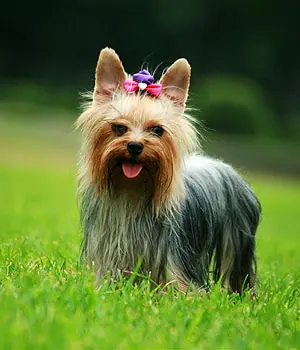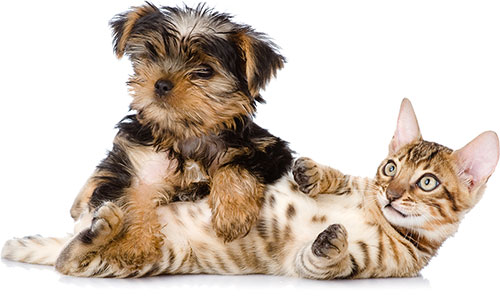Yorkshire Terrier

1171 S. Robertson Blvd., #248
Yorkie Rescue of America is a 501 (c) 3 that rescues Yorkshire Terriers from shelters, as well as...

Cape Coral FL 33909 United States
We are a small rescue group in the south Florida area, we adopt with in a 3 hour drive time from ...

We rescue, foster and care for Yorkies until an appropriate new forever home can be found. Please...

P.O. Box 544 Newfield NJ 08344 United States
Sherry’s Place, a non-profit 501c3 rescue service for Yorkies & other small dogs needin...

Clearwater FL 33755 United States
United Yorkie Rescue, Inc. was founded on August 5, 2002, by a group of loyal and hard-working re...

Davie FL 33330 United States
United Yorkie Rescue, Inc. was founded on August 5, 2002, by a group of loyal and hard-working re...

Gulfport FL 33770 United States
United Yorkie Rescue, Inc. was founded on August 5, 2002, by a group of loyal and hard-working re...

Jacksonville FL 32223 United States
United Yorkie Rescue, Inc. was founded on August 5, 2002, by a group of loyal and hard-working re...

Leesburg FL 34748 United States
United Yorkie Rescue, Inc. was founded on August 5, 2002, by a group of loyal and hard-working re...

United Yorkie Rescue, Inc. was founded on August 5, 2002, by a group of loyal and hard-working re...
Yorkshire Terrier

Breed Group : TOY
Origin : England
Average Height : 8" - 9"
Average Weight : 4 - 6 lbs.
Life Span : 12 - 16 years
Photo Courtesy info : Yorkshire Terrier National Rescue
-
Size
1 2 3 4 5 6 7 8 9 10 -
Energy
1 2 3 4 5 6 7 8 9 10 -
Intelligence
1 2 3 4 5 6 7 8 9 10 -
Ease of Training
1 2 3 4 5 6 7 8 9 10 -
Hypo-Allergenic
1 2 3 4 5 6 7 8 9 10 -
Shedding
1 2 3 4 5 6 7 8 9 10 -
Good with Kids
1 2 3 4 5 6 7 8 9 10 -
Good with Other Pets
1 2 3 4 5 6 7 8 9 10 -
Guard Dog
1 2 3 4 5 6 7 8 9 10
Yorkshire Terrier Rescue Organizations

1171 S. Robertson Blvd., #248
Yorkie Rescue of America is a 501 (c) 3 that rescues Yorkshire Terriers from shelters, as well as...

Cape Coral FL 33909 United States
We are a small rescue group in the south Florida area, we adopt with in a 3 hour drive time from ...

We rescue, foster and care for Yorkies until an appropriate new forever home can be found. Please...

P.O. Box 544 Newfield NJ 08344 United States
Sherry’s Place, a non-profit 501c3 rescue service for Yorkies & other small dogs needin...

Clearwater FL 33755 United States
United Yorkie Rescue, Inc. was founded on August 5, 2002, by a group of loyal and hard-working re...

Davie FL 33330 United States
United Yorkie Rescue, Inc. was founded on August 5, 2002, by a group of loyal and hard-working re...

Gulfport FL 33770 United States
United Yorkie Rescue, Inc. was founded on August 5, 2002, by a group of loyal and hard-working re...

Jacksonville FL 32223 United States
United Yorkie Rescue, Inc. was founded on August 5, 2002, by a group of loyal and hard-working re...

Leesburg FL 34748 United States
United Yorkie Rescue, Inc. was founded on August 5, 2002, by a group of loyal and hard-working re...

United Yorkie Rescue, Inc. was founded on August 5, 2002, by a group of loyal and hard-working re...
-
The Yorkie was created by working men of north England, who developed the breed for catching the terrible rats and mice that infested clothing mills and mine shafts. These hunting dogs could penetrate into badger and fox burrows.
The breed is not very old, but its origins are not entirely certain. However, it seems likely that Scotsmen seeking work in the woolen mills of Yorkshire brought with them various types of terrier, including the Skye Terrier, Dandie Dinmont, Manchester Terrier, Maltese and the now-extinct Clydesdale (Paisley Terrier). These were then crossed with local types, such as the longhaired Leeds Terrier.
At first, the Yorkie was a much bigger animal than the one we see today, but by selectively breeding the smallest individuals, the dog was gradually miniaturized over the years. It was made into a fashion dog. Women carried these little dogs in their bags and under their arms. The Yorkshire Terrier was first recognized by the AKC in 1885.
In 1984 a piebald Yorkie was born as a result of a genetic recessive gene occurrence from two Yorkshire Terriers. Today the piebald dogs are considered a different breed which is named the Biewer or Biewer Yorkie.
-
• One of the most intelligent smartest of all breeds.
• Yorkies are versatile and excel in all dog sports, including Obedience, Agility and Flyball.
• Hypo-Allergenic ~ low shedders, perfect for allergy sufferers.
• Love to be involved & active.
• Energetic, Affectionate, Brave, and Loyal.
• Can be yappy, but generally not a ‘barker’, depending on owner and the lifestyle it is subjected to.
• Yorkies that are allowed to become demanding & dependent can develop jealous behaviors that leads to ‘snapping’ if surprised, frightened or over-teased.
• Can be difficult to House Train, but excellent & easy training in other areas such as Obedience and Dog Sports.
• Do not do well in cold, damp climates.
• Not recommended for toddlers because of their delicate, tiny size.
• Have delicate digestive systems, can be picky eaters.
• Yorkies have a ‘Napoleon Complex’: they think are a 'big' dog ~ not aware they aren’t.
• Can retain their puppy 'milk' teeth longer than other breeds.
• Excellent Watchdog.
• Good with children.
• Sweet Toy Dogs.
• Easier keepers.
• Silky Coat makes it easy to groom, and choice of looks: long or short coats – or some are clipped to have a Terrier
look with eyebrows and beards.
Temperament
Although the Yorkshire Terrier is a small toy breed best know for his beautiful silky coat and spunky character, there are a lot of great things that make this breed so popular. The Yorkie is a fearless watchdog. They have a great sense of hearing and can usually hear someone coming long before they get to the door. The Yorkshire seems unaware of his small size. They are devoted to their owners. Most will prefer to share your bed if you allow. Full of energy they can keep up with kids. Because of their small size they might need more supervision with smaller children. They are eager to play and get into any trouble they might find. They have a mind of their own and this feisty, sweet little dog doesn't like to do anything he makes up his mind not to do! Even though is breed categorized as a toy there is still a lot of terrier left in them. They like to be busy, inquisitive, and bold. They can be aggressive towards animals so it is always a good idea to introduce with caution. While a toy, and at various times a greatly pampered one, the Yorkshire is a spirited dog that definitely shows its inner personality.
Grooming
The positive part of a Yorkie's hair is that they do not shed. It can take a lot of time to brush and groom this breed. If you are not showing this them there are various pet trims available for Yorkshires.
It is not uncommon for the Yorkie to be sporting a Westie trim. This is the same trim that is very common for the West Highland White Terrier. To keep the coat smooth and clean you need to brush them almost daily.
On the upside they don't need to be cut as often as some other toy breeds such as the Poodle.
Exercise
Yorkies are adventurous little dogs. They do not require a lot of exercise but do enjoy going on walks. The need plenty of attention and playtime is a great way to exercise these small dogs. They love room to run but might need to stay in a restrained area with so many hazards available to such a tiny animal. Being such a popular breed it is best to always keep these dogs within sight. A lot of dog owners have toy breeds that never get them returned if lost or stolen. It is always a good idea to keep various toys around for them to play with. They will mostly enjoy any game that interacts with their owners.
Training
Yorkshire Terriers are very intelligent, but they can also be a little stubborn. Keeping the training happy and fun it a great way to get through to the Yorkies. They may tend to get bored and it is important to make it a fun, positive experience for them. One way to teaching your Yorkie new tricks is by holding a small treat in your hand. Treats and lots of praise tend to work well with Yorkies. It also helps to have a good sense of humor because they will try to "outsmart" you. If starting with a puppy, Puppy Kindergarten is a great way to go. Not only does this help them to learn new things but also owners might learn the best ways to deal with their dog's individual personalities. Also another positive of Puppy Kindergarten is the social aspect. This teaches your new puppy at a very young age how to socialize with other dogs. This will help them in the future to be less aggressive towards new dogs or environments.
Because these dogs love to run and play it is important to keep them on a leash or within a closed off area where they cannot escape. Because of the popularity of this breed the chances of having them returned if lost is decreased. It is also a great idea to have them micro chipped for extra safety.






